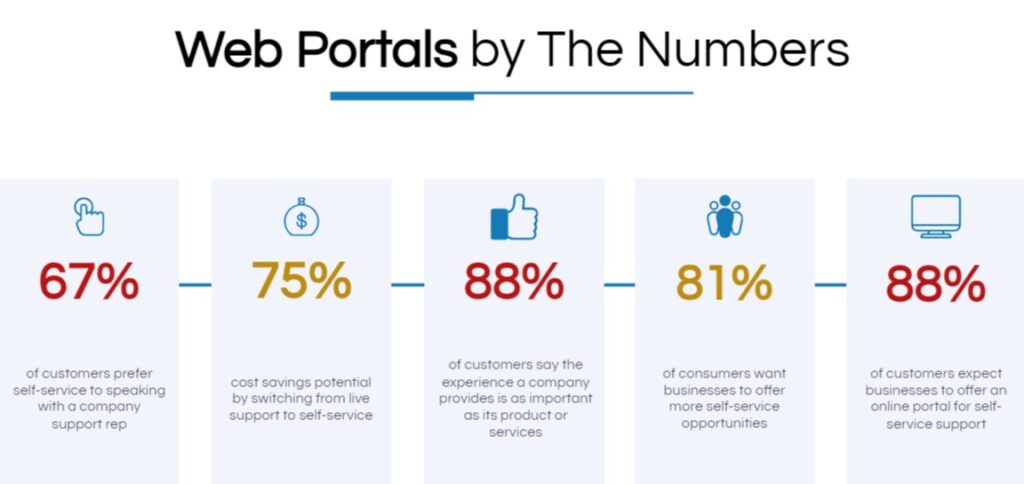In today’s digital-first environment, consumers have grown accustomed to the convenience and efficiency of self-service web portals in their personal lives. Online banking systems, healthcare portals, digital retirement planning solutions, and online shopping have all become increasingly integrated into daily activities.
This shift towards digital autonomy sets a high standard for customer expectations, which businesses—regardless of size—must strive to meet.
For small to mid-market businesses (SMBs), whether serving other businesses or providing products and services directly to consumers, web portals offer a unique opportunity to enhance customer engagement, streamline operations, and leverage technology to stay ahead.
What Makes a Good Web Portal in 2024?
A well-designed web portal in 2024 must be easy to use, secure, and highly functional. It should offer:
- Seamless Integration: Easily integrates with existing business systems (CRM, ERP, accounting software) to streamline operations and provide a unified view of customer profiles and activities.
- Enhanced Security: Robust security features including multi-factor authentication, data encryption, and compliance with international standards to protect sensitive information.
- Intuitive Design: A clean, responsive design that is accessible on any device, enhancing user experience and satisfaction.
- Real-Time Data Access: Provides up-to-the-minute data to users, enabling informed decision-making and immediate action on critical tasks.
- Personalization: Offers customized user experiences that cater to the individual preferences and needs of users, increasing their engagement and loyalty.
What Types of Web Portals Should Business Owners Know About?
Customer Portal
Imagine a place where your customers can manage their accounts at their convenience. They can view transactions, pay invoices, submit service requests, and communicate directly with your support team—anytime, anywhere.
From a business perspective, this leads to reduced support costs, increased customer satisfaction, and higher retention rates.
Vendor Portal
Envision a streamlined platform where vendors can manage orders, submit invoices, and ensure seamless synchronization between your inventory and procurement systems.
This not only reduces processing times and errors but also strengthens vendor relationships by offering transparency and easier collaboration.
Employee Portal
A central hub where employees can access HR resources, request paid time off (PTO), manage benefits, and view payroll information.
This reduces HR bottlenecks, empowers employees with self-service capabilities, and improves overall job satisfaction and productivity.
Candidate Portal
For businesses looking to grow, a candidate portal can revolutionize the recruitment process. Prospective employees can apply, track their application status, and onboard themselves once hired.
This not only enhances the candidate experience but also streamlines the hiring process, reducing the time and resources spent on recruitment.
Custom Portals
A web-based portal can be precisely tailored to any business in any industry.
See how a national logistics management company uses a driver check-in portal to fulfill orders in record time.
Aligning with Modern Consumer Expectations
Today’s consumers expect digital convenience, and web portals are perfectly poised to meet these expectations. By providing self-service capabilities, businesses can offer the autonomy that modern users insist upon, leading to increased customer satisfaction and engagement.
Moreover, the transparency and efficiency of web portals foster trust and loyalty among users, whether they are customers, vendors, or employees:
- 67% of customers prefer self-service to speaking with a company support rep
- 80% of customers say the experience a company provides is as important as it products or services
- 75% cost savings potential by switching from live support to self-service
- 88% of customers expect businesses to offer an online portal for self-service support
- 81% of consumers want businesses to offer more self-service opportunities

The ROI of Implementing Web Portals in SMBs
Incorporating web portals into daily operations presents significant benefits for SMBs, and can provide a strategic competitive advantage in every industry. These include:
- Cost Efficiency: Automating routine tasks reduces labor costs and minimizes errors, leading to a more efficient operation.
- Increased Productivity: With streamlined processes, employees can focus on higher-value tasks instead of administrative overhead.
- AI-Enhanced Data Insights: Integrated systems provide valuable data insights, enabling better business decisions and strategic planning.
- Scalability: Web portals can easily scale with your business, supporting growth without the need for additional resources.
Ready-to-Go Portals vs Custom Web Portals
In the digital transformation journey, businesses face a pivotal decision when adopting web portal technology.
It can be tough to decide whether to develop a custom web portal tailored specifically to their unique requirements or to opt for a ready-to-go portal that caters to general needs with minimal customization. This choice hinges on several factors, including the business’s size, industry, growth trajectory, and specific operational needs.

Ready-to-Go Portals: Efficient Solutions for SMBs
For businesses with less complex needs, ready-to-go portals offer a cost-effective and quick-to-deploy alternative. These portals are pre-built and come with a set of standard features that cater to the common needs of businesses within a particular industry.
Advantages of Out-of-the-Box Solutions:
- Cost Efficiency: Lower upfront costs and reduced development time make these solutions appealing for businesses with limited budgets or those just starting with web portals.
- Rapid Deployment: Pre-made portals can be deployed quickly, allowing businesses to benefit from web portal functionalities without lengthy development times.
- Industry-Specific Options: Many vendors offer ready-to-go portals tailored to specific industries, which include necessary features that are relevant to that industry’s common operational procedures.
These web portal solutions are ideal for businesses that need standard functionalities such as basic CRM tools, invoice management, or content management systems and do not require extensive customization to meet their business objectives.
Custom Web Portals: Tailored Solutions for Growing Businesses
Custom web portals are designed to fit the intricate needs of businesses with specific workflows, integration requirements, or customer engagement strategies.
These portals are particularly beneficial for businesses that are moving beyond standard operations and require advanced functionality not offered by out-of-the-box solutions.
Advantages of Custom Web Portals:
- Tailored User Experience: Custom portals can be designed with the end-user in mind, providing a seamless experience tailored to the specific needs and preferences of the business’s customers, vendors, or employees.
- Unique Functionality: Custom portals allow for the incorporation of unique features that are aligned with the business’s strategic goals, such as advanced analytics, custom workflows, or specialized ecommerce capabilities.
- Scalability and Flexibility: As the business grows, custom portals can evolve to accommodate new processes, integrate with other tools, and fit changing business environments without the constraints of predefined functionality.
Growing businesses often find that custom web portals offer a competitive edge by enhancing operational efficiency, improving customer satisfaction, and providing deeper insights through customized reporting and analytics.
What’s Next?
The investment in web portal technology pays off by meeting and exceeding the expectations of the modern digital consumer and workforce.
As SMBs look to the future, the implementation of integrated web portals is not merely an enhancement but an essential component of business strategy that offers a measurable competitive advantage. By embracing these digital tools, businesses can ensure they remain competitive, agile, and responsive in the rapidly evolving business landscape.
In order to get started, consider scheduling a meeting with one of our software consultants to identify needs and see how a web portal can benefit your business.


